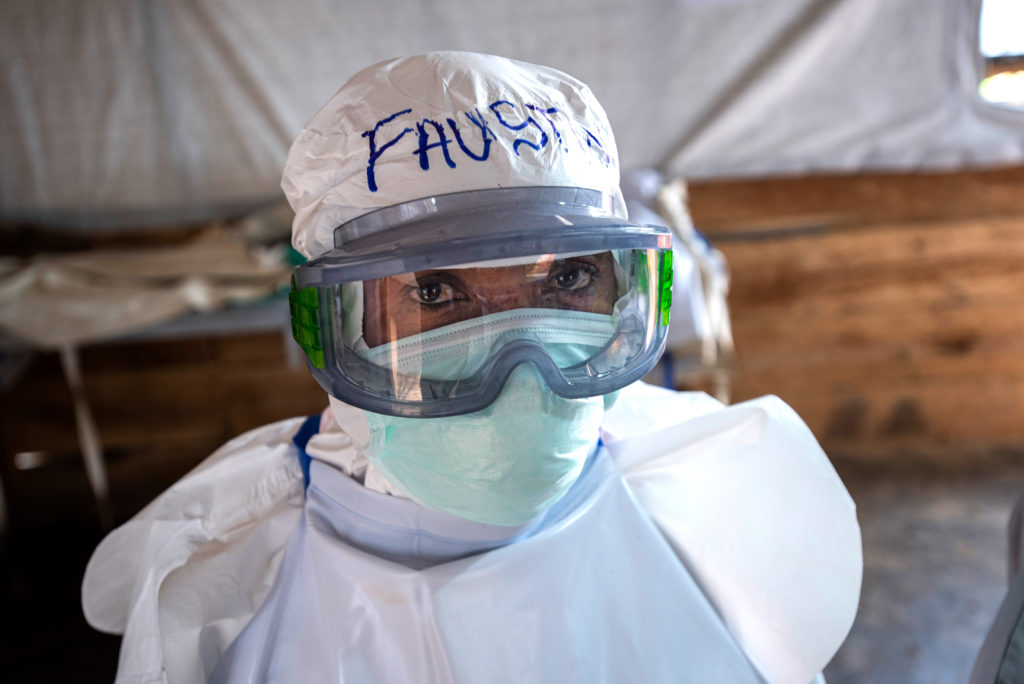On August 1, 2018, an outbreak of Ebola was declared in the North Kivu and Ituri provinces of the Democratic Republic of the Congo (DRC) that grew to become the second-largest ever—exceeded in size only by the 2014 outbreak in West Africa. It wasn’t until June 25, 2020—and nearly 3,324 cases later, leading to 2,287 deaths—that the outbreak in the east would be officially declared over by the World Health Organization (WHO).
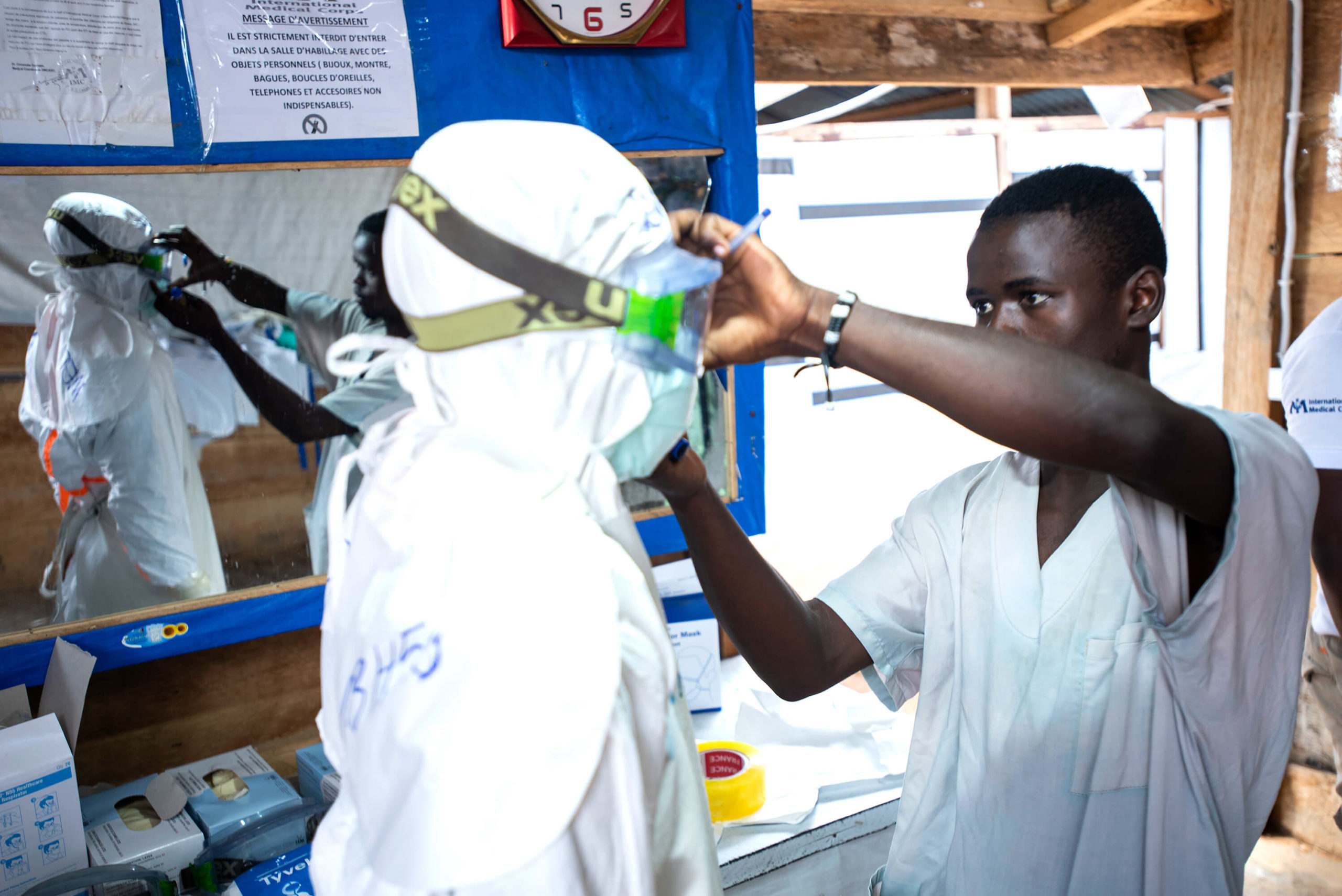
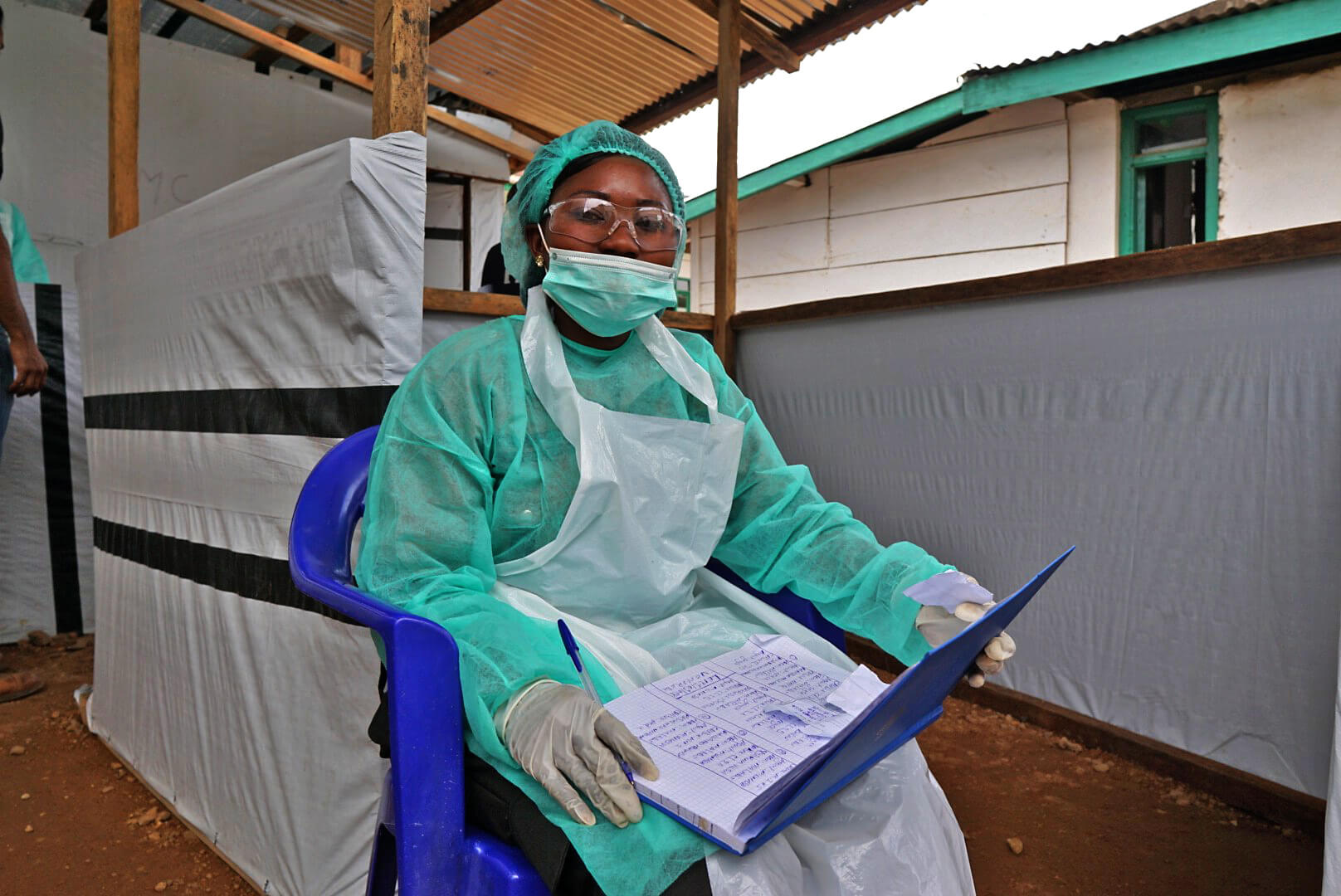
Here, we cover the timeline of our response, look back at landmark moments and meet survivors, volunteers—and the health workers who helped to end the outbreak.
August 2018
“Past Ebola outbreaks in the DRC have been well-controlled within a few weeks. Little did we know that the 10th outbreak in the country would spread so extensively—we have learned to never underestimate an outbreak.”
Dr. Eta Ngole, International Medical Corps, DRC
On August 1, just days after an outbreak in the northwest of the country had officially been declared over, the WHO announces the presence of a cluster of Ebola cases in the North Kivu province of the DRC, an area in the east where conflict is common and widespread. In response, International Medical Corps teams begin Ebola prevention, monitoring and surveillance activities, drawing on our extensive experience responding to the 2014 West Africa Ebola epidemic, as well as to the outbreak we’d just wrapped up.
“There is the fear that the conflict will somehow affect our ability to respond to the outbreak.”
Dr Joseph Fair, a virologist and outbreak response specialist with International Medical Corps, speaking to NPR about how conflict in the area of the outbreak could hamper response efforts.
September 2018
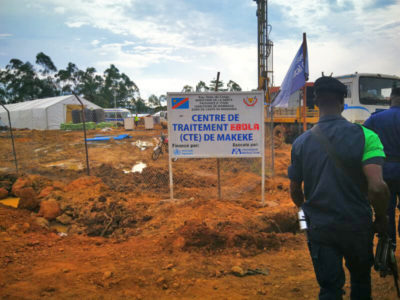
“No one should be sleeping well tonight around the world.”
Peter Salama, then Emergency Response Chief for the WHO, speaking about a confirmed case of Ebola in Butembo, home to an estimated 1 million people.
Our response continues to expand, as we train frontline health workers in 15 health facilities and open an Ebola Treatment Center (ETC) in Makeke—the sole ETC in Ituri province, where the outbreak has spread.
October 2018
Two health workers are shot and killed by Congolese rebels on the outskirts of Butembo, as case numbers continue to rise amid an unstable climate.
Beni, in North Kivu province, becomes the new epicenter of the outbreak, with more than 100 new cases recorded.
November 2018
We continue the fight against Ebola. We’ve constructed 17 screening and referral units, and built capacity that has enabled health staff to screen more than 115,000 individuals. Read about how we’re containing the worst outbreak in the DRC’s history: https://t.co/cjuepS6BhJ
— International Medical Corps UK (@IMC_UK) November 15, 2018
December 2018
Our President and CEO Nancy Aossey appeared on @NewsHour to discuss the challenges of responding to the devastating #Ebola outbreak in the #DRC.
Watch the video: (If you’re in a hurry, skip to minute 3:44 for Nancy’s interview.) https://t.co/aysN1D4Gyh
— International Medical Corps (@IMC_Worldwide) December 19, 2018
“Many times, we felt like the outbreak would never end. In December, when the ETCs almost had to close due to attacks, we asked ourselves, “will it ever end?”
Dr. Eta Ngole, International Medical Corps, DRC
January 2019
We start 2019 with great news from our ETC in Mangina, in North Kivu province.
What a way to kick start 2019! We’ve had some great news from our team in the #DRC: Our first #Ebola survivor has just been discharged from Mangina.
Watch the celebrations below: pic.twitter.com/HCaASq2cQ8
— International Medical Corps UK (@IMC_UK) January 4, 2019
There’s more good news three weeks later, when Sylvie, Ezechiel and Solange are discharged from our ETC.
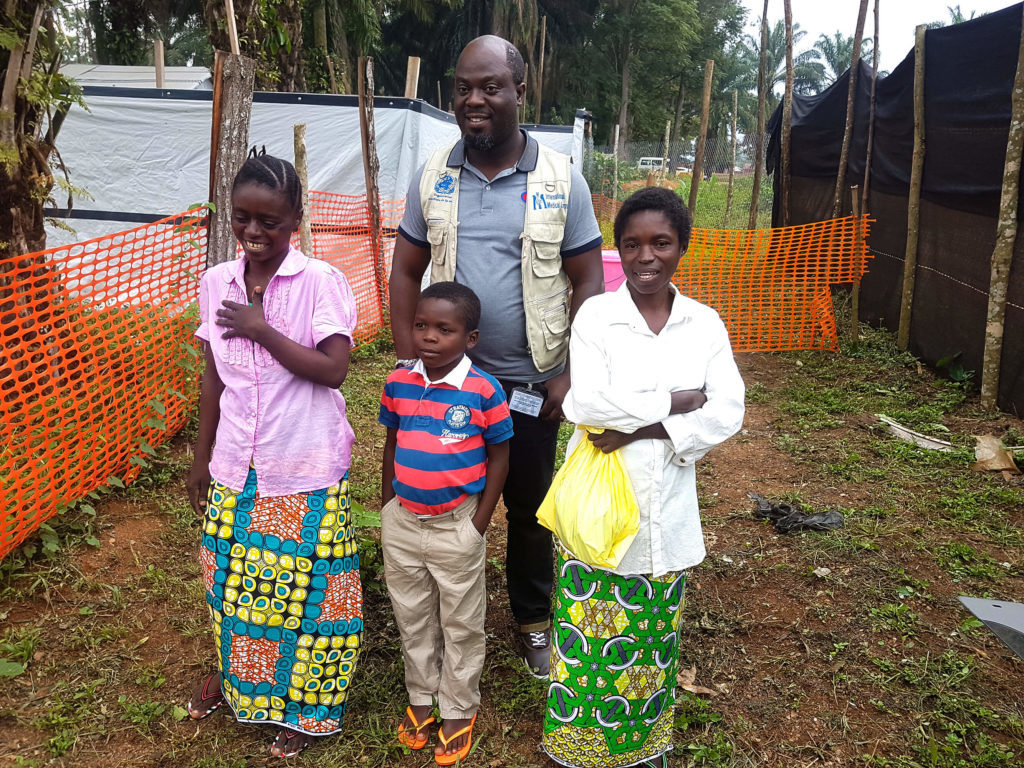
But overall case numbers continue to rise.
The Ebola outbreak simmering in the Democratic Republic of the Congo (DRC) is worsening in some ways, despite major successes in combating the illness in some parts of the country. https://t.co/ZaoqDQ2BXQ
— Axios (@axios) January 24, 2019
February 2019
Our screening and referral units (SRUs) have now screened more than 600,000 people for the virus.
March 2019
As confirmed #Ebola cases surpass 1,000, we must remember that “…behind every number is a person, a family and a community that is suffering”.
Together, we can relieve the suffering of those in need. Sign up to learn how: https://t.co/t6Z8zLYWFq https://t.co/W4rrKrZqPe
— International Medical Corps (@IMC_Worldwide) March 25, 2019
April 2019
The DRC’s Ebola outbreak is spreading at its fastest rate yet, eight months after it was first detected, the WHO said on Monday.
Reuters
As the outbreak continues to escalate, so too does our response. We’ve now constructed 43 screening and referral units (SRUs), trained 1,350 healthcare workers in infection prevention and control (IPC) measures and conducted more than 880,000 screenings for the virus.
And in better news still, our ETC cures its ninth patient.
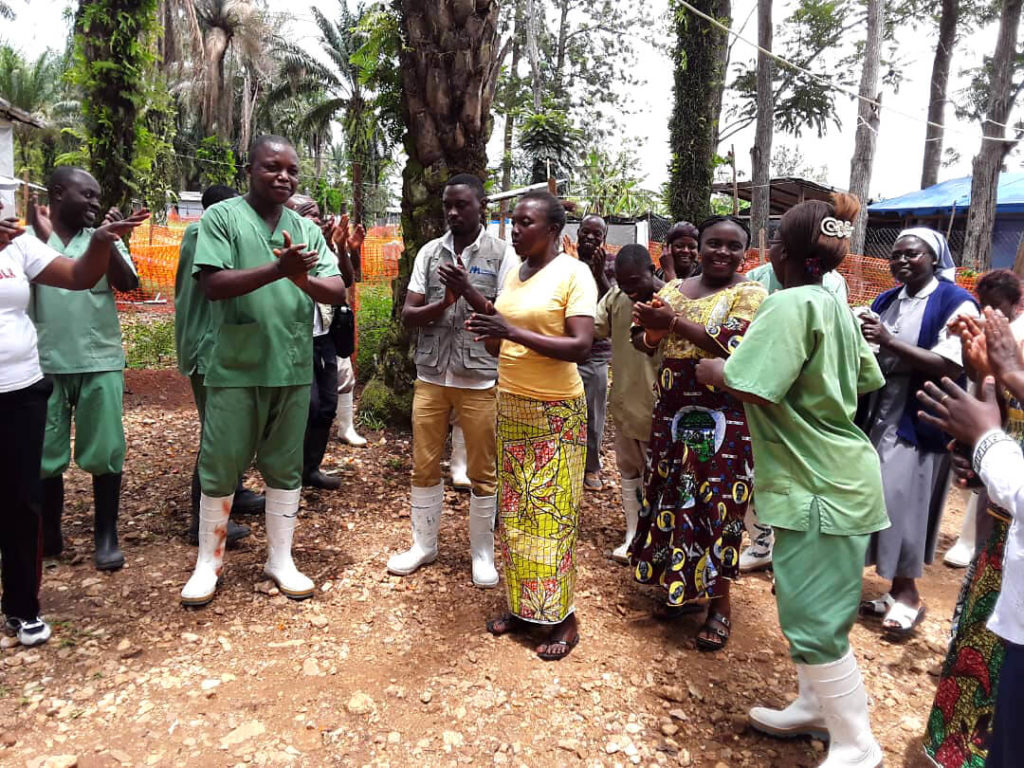
May 2019
Global news outlets start covering the outbreak as confirmed cases pass the 1,500 mark.
The #Ebola outbreak in the #DRC is beginning to appear in national news outlets. We welcome the increased attention, but we will not forget those who have helped us raise awareness of the desperate needs of those affected since July. https://t.co/lBABTt9D8I
— International Medical Corps UK (@IMC_UK) May 16, 2019
June 2019
“Health workers are afraid to wear protective equipment because they fear they will be targeted by armed groups, the World Health Organization has said.”
The Guardian
Conflict continues to hamper response efforts, as confirmed cases pass 2,000. A case is confirmed in neighboring Uganda, prompting fears of the outbreak spreading there.
But we still have hope.
Beautiful scenes from the Democratic Republic of the Congo where a five-year-old boy and two young men have recovered from Ebola!
Together, we can create more moments like this → https://t.co/lZjiKqblJp pic.twitter.com/JgLmk4Wg93
— International Medical Corps UK (@IMC_UK) June 6, 2019
🔊 VOLUME UP 🔊
You’re going to want to hear the sound of locals in Mangina celebrating two more patients cured of #Ebola at our Ebola Treatment Center! pic.twitter.com/gIYWHOsPWb
— International Medical Corps (@IMC_Worldwide) June 24, 2019
July 2019
July starts positively, as the number of patients we have cured at our ETC passes 100.
Late last week, 7 people (yes 7!) left our Ebola Treatment Centre in the Democratic Republic of the Congo cured of the vicious disease, including two children aged just 3 and 4 years old! Here are the legends! 💪 😀 🎉 pic.twitter.com/AFZAY1I5ga
— International Medical Corps UK (@IMC_UK) July 1, 2019
And there’s more reason for positivity, as more patients are discharged.
🇫🇷 J’ai vaincu Ebola
🇺🇸 I defeated EbolaWhatever language you say it in, doesn’t it just sound great?
Eight more patients have just beaten #Ebola and left our Ebola Treatment Center in Mangina! pic.twitter.com/nUbfnoMXVh
— International Medical Corps (@IMC_Worldwide) July 14, 2019
But momentum is lost when a case is confirmed in the city of Goma, the capital of North Kivu, home to 2 million people and an important trading hub between the DRC and Rwanda.
On July 17, the WHO declares the Ebola outbreak a global health emergency: “Extraordinary work has been done for almost a year under the most difficult circumstances. We all owe it to these responders—coming from not just WHO but also the government, partners and communities—to shoulder more of the burden.”
Dr. Tedros Adhanom Ghebreyesus, WHO Director-General
As we approach the one-year anniversary of the deadly outbreak, we get good news from our ETC: seven more patients, including a five-month-old, have been cured!
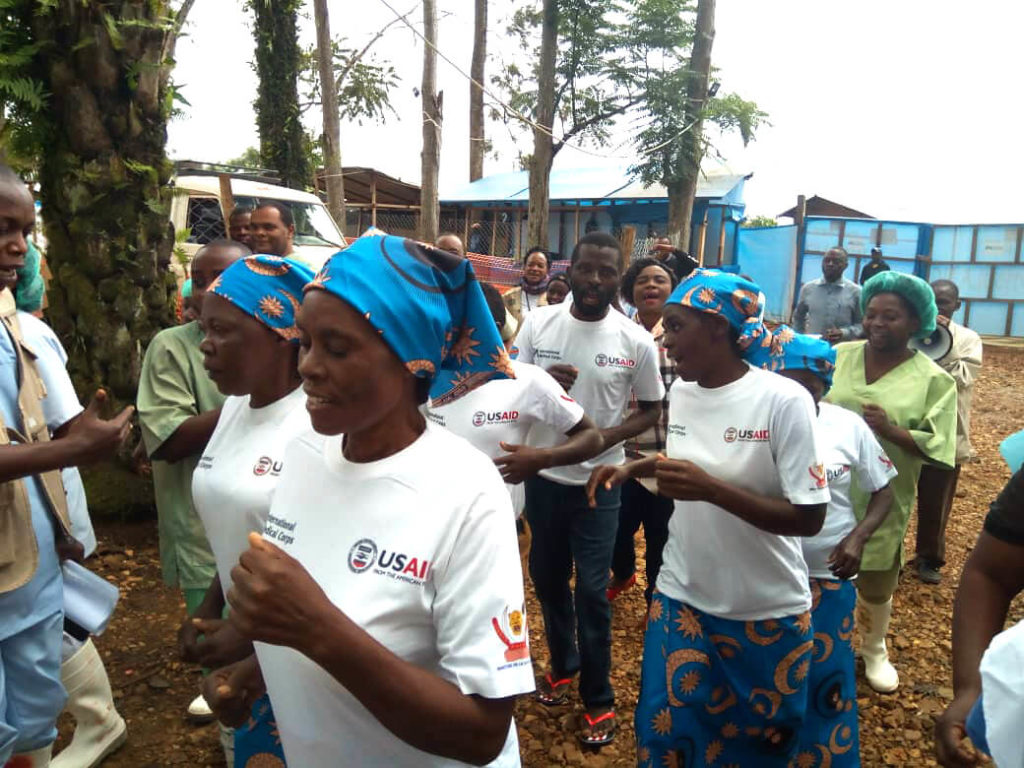
“Every day was a memorable moment—especially those when a patient was discharged from the ETC, and every day as our teams stayed safe despite working in communities where conflict is common and the risk of contamination with Ebola is high.”
Dr. Eta Ngole, International Medical Corps, DRC
August 2019
We pass two landmarks in our response, curing 150 people at our ETC and providing more than 1 million screenings at our SRU’s.
We also play a role in the research trial that discovers two drugs that help lower the mortality rate of the deadly virus: “Two new Ebola treatments are proving so effective they are being offered to all patients.”
CNN
But the progress comes too late for many, as the grim milestone of 2,000 deaths due to the virus is passed.
September 2019
🙌 Great to have everyone visit our team in Mangina.
Our #Ebola treatment centre—a proud partner in the clinical trial to find a cure—has helped treat over 350 confirmed patients and healed more than 160 so far. @WHO @theOFDA @USAID @MinSanteRDC @antonioguterres @DrTedros https://t.co/7l2Ox067Fi— International Medical Corps UK (@IMC_UK) September 2, 2019
October 2019
In response to a case of Ebola being reported in a town near the South Sudan border, we start Ebola awareness-raising activities in South Sudan, using dance and radio shows to engage with community members.
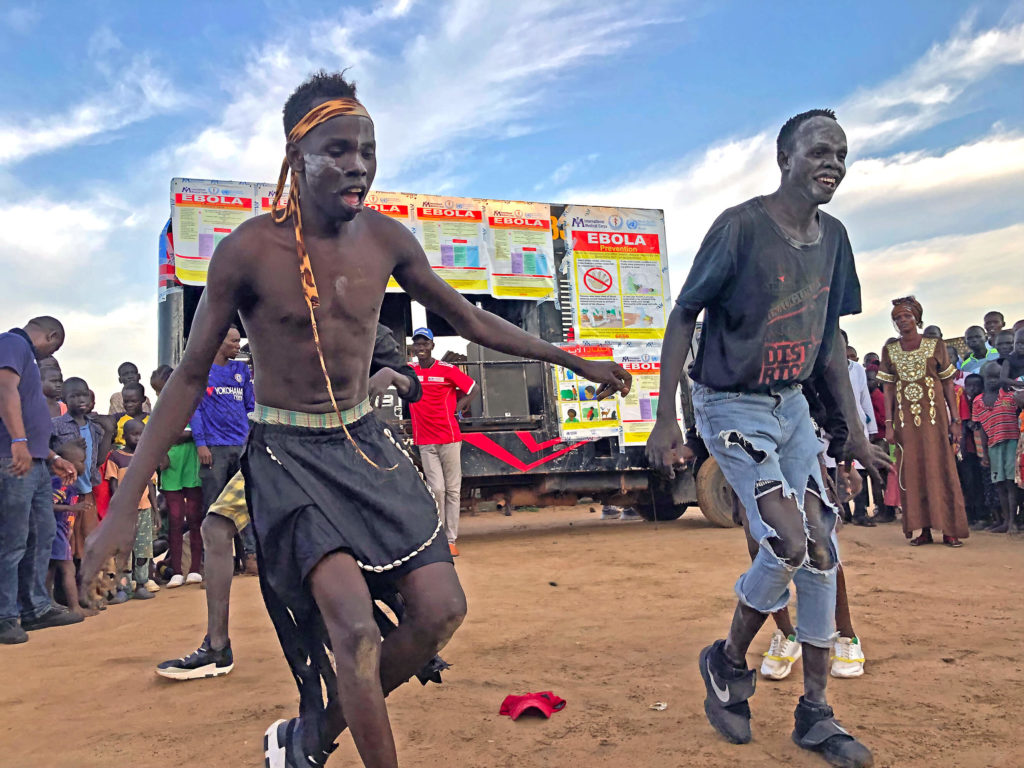
United Nations Secretary-General Antonio Guterres and WHO Director-General Dr. Tedros Adhanom Ghebreyesus visit our Mangina ETC.
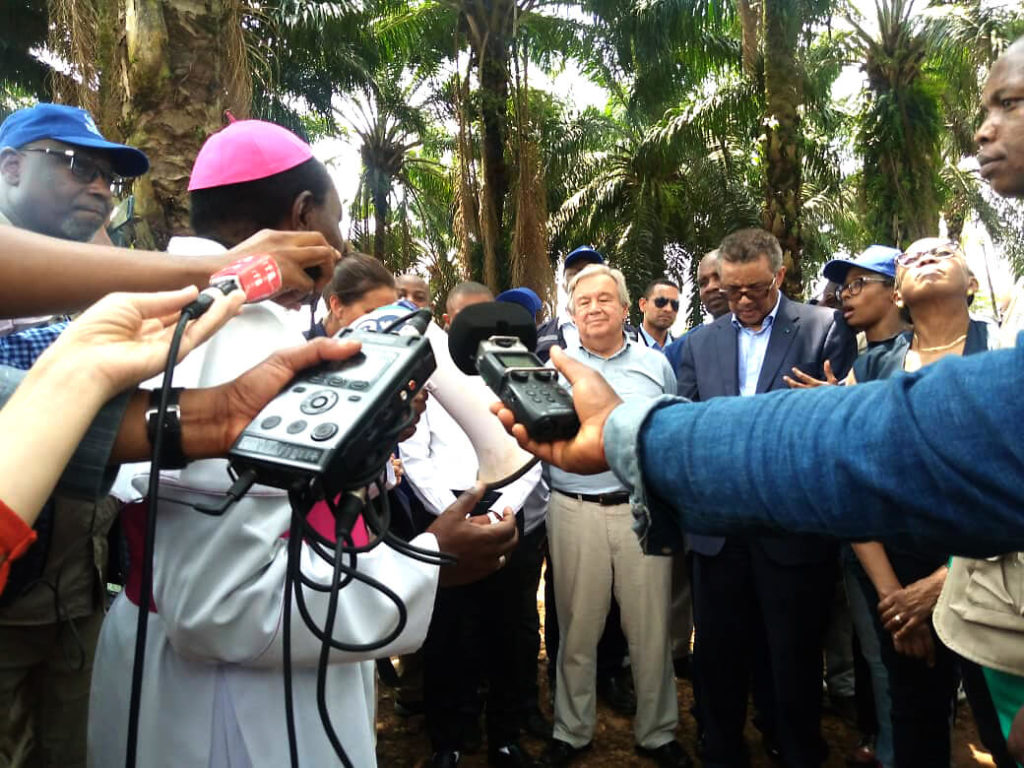
And great news follows just days later, when the 1,000th survivor of the outbreak leaves our ETC.
Turn the volume up and join in with Marguerite (who doesn’t know yet she’s the 1000th survivor) as she dances along with the team and survivors to celebrate that they are going back home after successfully beating #Ebola #1000survivors @MinSanteRDC @IMC_Worldwide @UN pic.twitter.com/avhRH5aCp2
— David Gressly (@DavidGressly) October 4, 2019
November 2019
Great news! After more than two decades of research, the world finally has an approved Ebola vaccine. More via @statnews ⬇️
There is still lots to be done to #StopEbola and we continue our work on the frontlines in the #DRC, treating and curing patients. https://t.co/CRFMl2BNuq
— International Medical Corps UK (@IMC_UK) November 13, 2019
Constance Kavira is cured of Ebola after catching it from her work as a nurse.
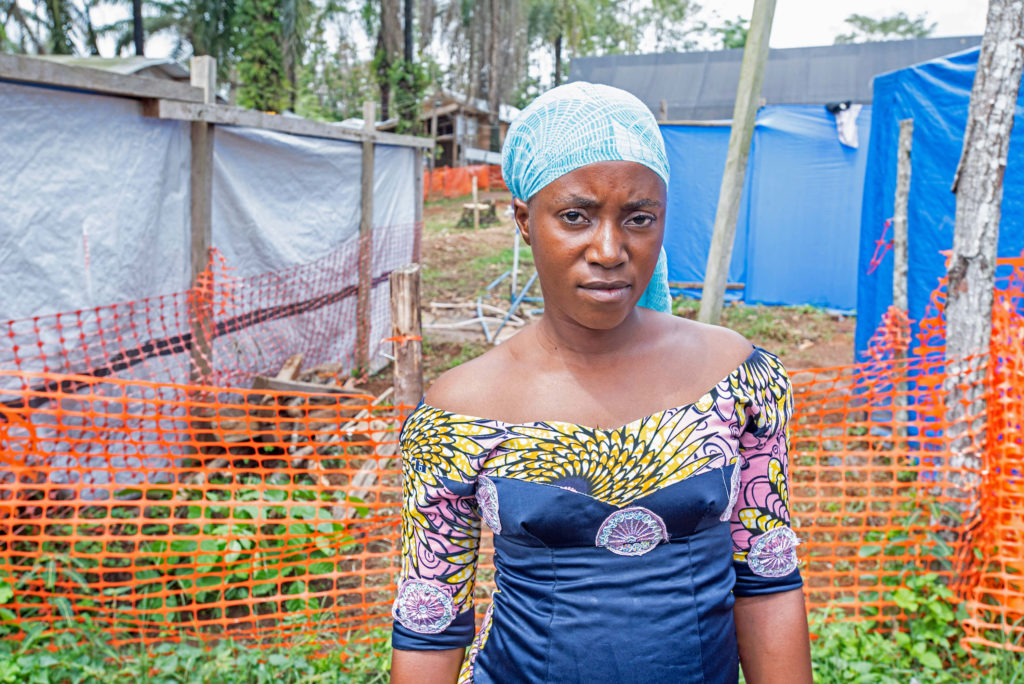
December 2019
We’re featured in a PBS account of the realities of fighting Ebola in a conflict zone.
FRONTLINE reports from inside the second-largest Ebola outbreak ever in a region of the Democratic Republic of Congo devastated by decades of conflict. https://t.co/QSalTOVarB pic.twitter.com/eI7xDiCBfz
— FRONTLINE (@frontlinepbs) December 24, 2019
February 2020
February starts positively with a successful trial by our Ebola research team.
A study by our Ebola Research Team has found that a low-cost antibiotic may reduce the mortality rate among those suffering from #Ebola. Hear from Dr Adam Levine, primary lead, on the importance of the study below and then get the full story here: https://t.co/wXBRxeVMeh pic.twitter.com/mLpYcx8v4B
— International Medical Corps UK (@IMC_UK) February 7, 2020
And the reunification of Tresor with his family.
“I got the hope to survive from Ebola.”
Watch Tresor reunite with his family after he was cured at our @usaid-funded #Ebola Treatment Center below ⬇️
@theOFDA pic.twitter.com/10i7vQcPNP— International Medical Corps (@IMC_Worldwide) February 16, 2020
March 2020
We build 23 new SRUs along the DRC’s eastern border.
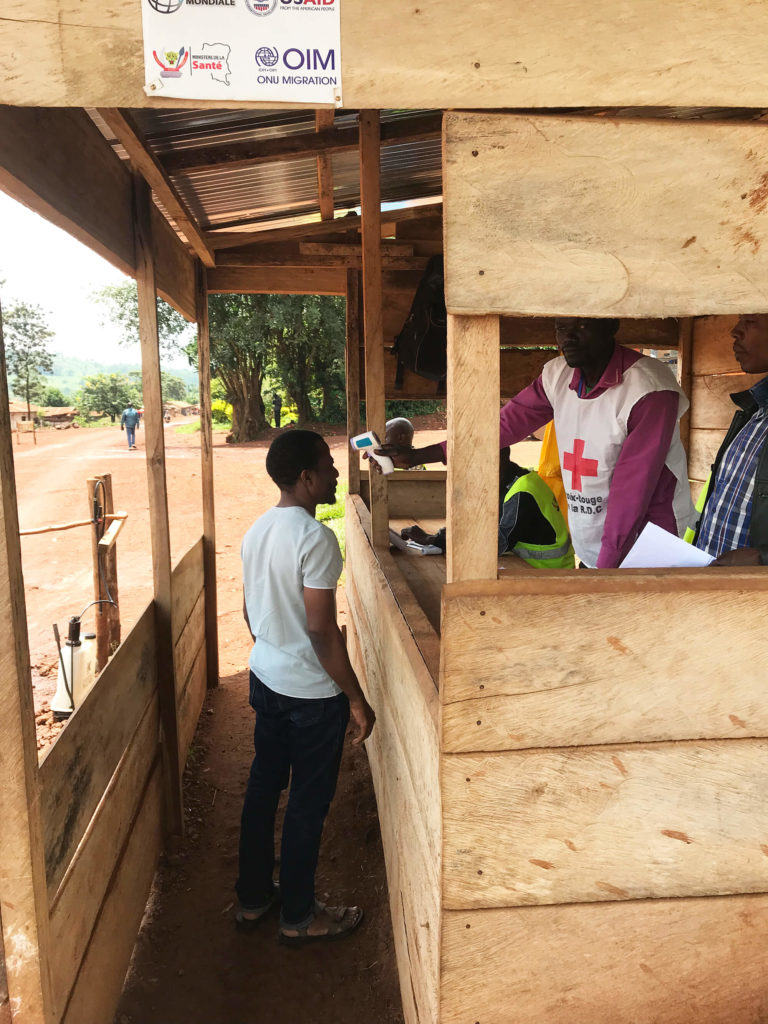
"As surveillance, funding from donors, vaccination and getting the community engagement with prevention measures increased, the case numbers started to decrease."
Dr.Eta Ngole, International Medical Corps, DRC
April 2020
NEWS: Just days before the #DRCongo was preparing to announce an end to the #Ebola outbreak, a new case was confirmed. @USAID is committed to bringing an end to this outbreak. We provided humanitarian assistance in DRC before the outbreak & our commitment will remain. pic.twitter.com/xNicZPElNc
— USAID’s Bureau for Humanitarian Assistance (@USAIDSavesLives) April 10, 2020
June 2020
Health officials in the DRC are alarmed in early June, as four people die from Ebola in Équateur Province, about 750 miles away from the ongoing outbreak in the east.
But there is good news toward the end of June, as the eastern outbreak is officially declared over by the DRC Ministry of Health and WHO.
🙌 for every single health worker and community volunteer who helped end the 10th outbreak of #Ebola in the #DRC!
Together, the humanitarian community must now focus on containing the outbreak in Mbandaka. Together, we have shown that we can #StopEbola.https://t.co/vUNGJbFtUm
— International Medical Corps (@IMC_Worldwide) June 25, 2020
“The feeling was like, yes, at last, it’s over. But it also brought back memories of patients who had lost their lives to the outbreak, as well as their families. It made us think of colleagues who had lost their lives on the frontlines, that they had not done so in vain.”
Dr. Eta Ngole, International Medical Corps, DRC
The 716-day battle against the DRC’s deadliest Ebola outbreak would not have been won without the tireless work and sacrifices of everyone involved in the response. A special mention must, however, be given to community health workers like Masika and Mayongezo, who helped to build trust within communities and fought potentially life-threatening rumors by sharing important health messages with their communities. Simply put, community health workers were—and continue to be—an indispensable part of any outbreak response.
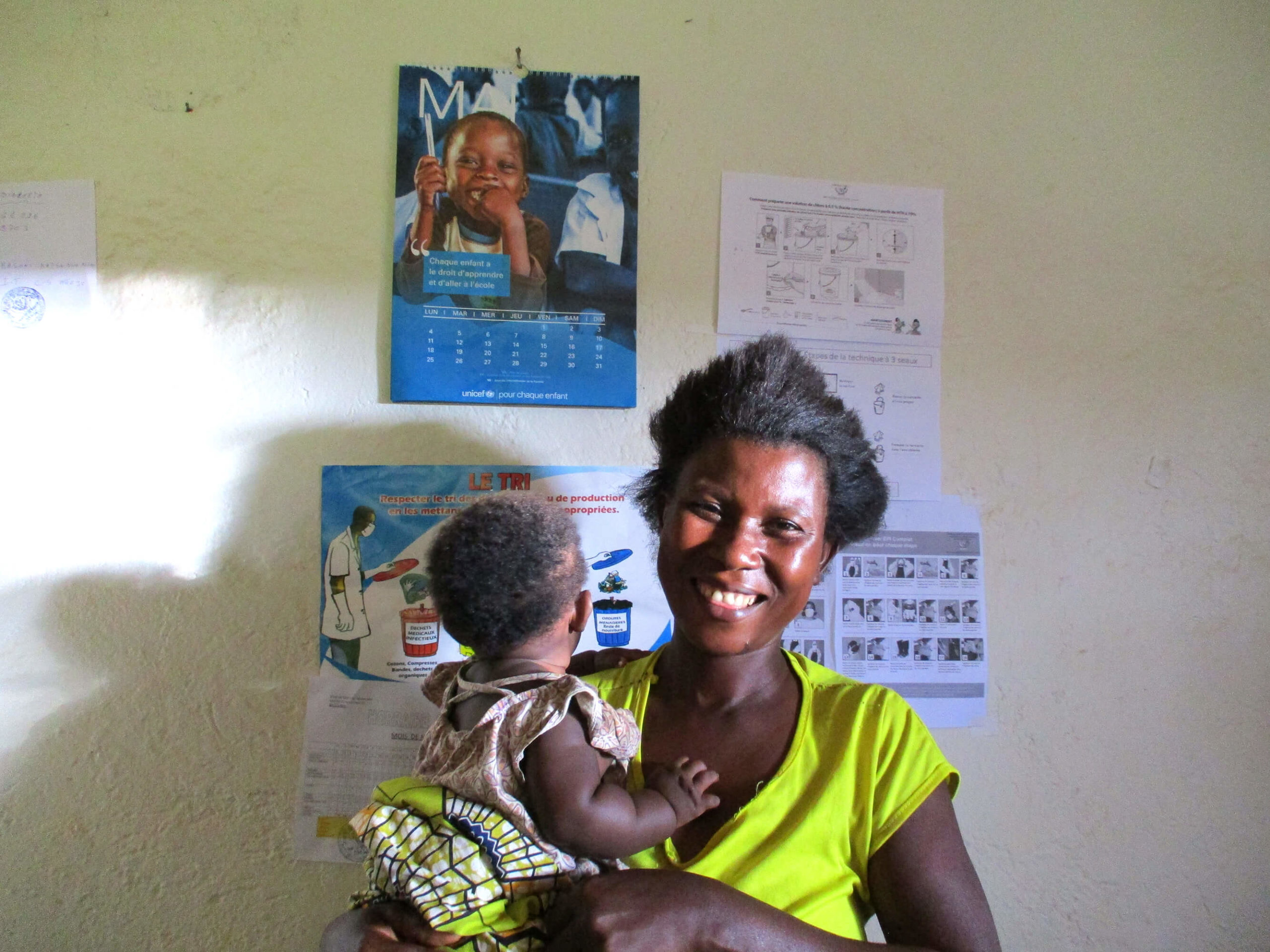
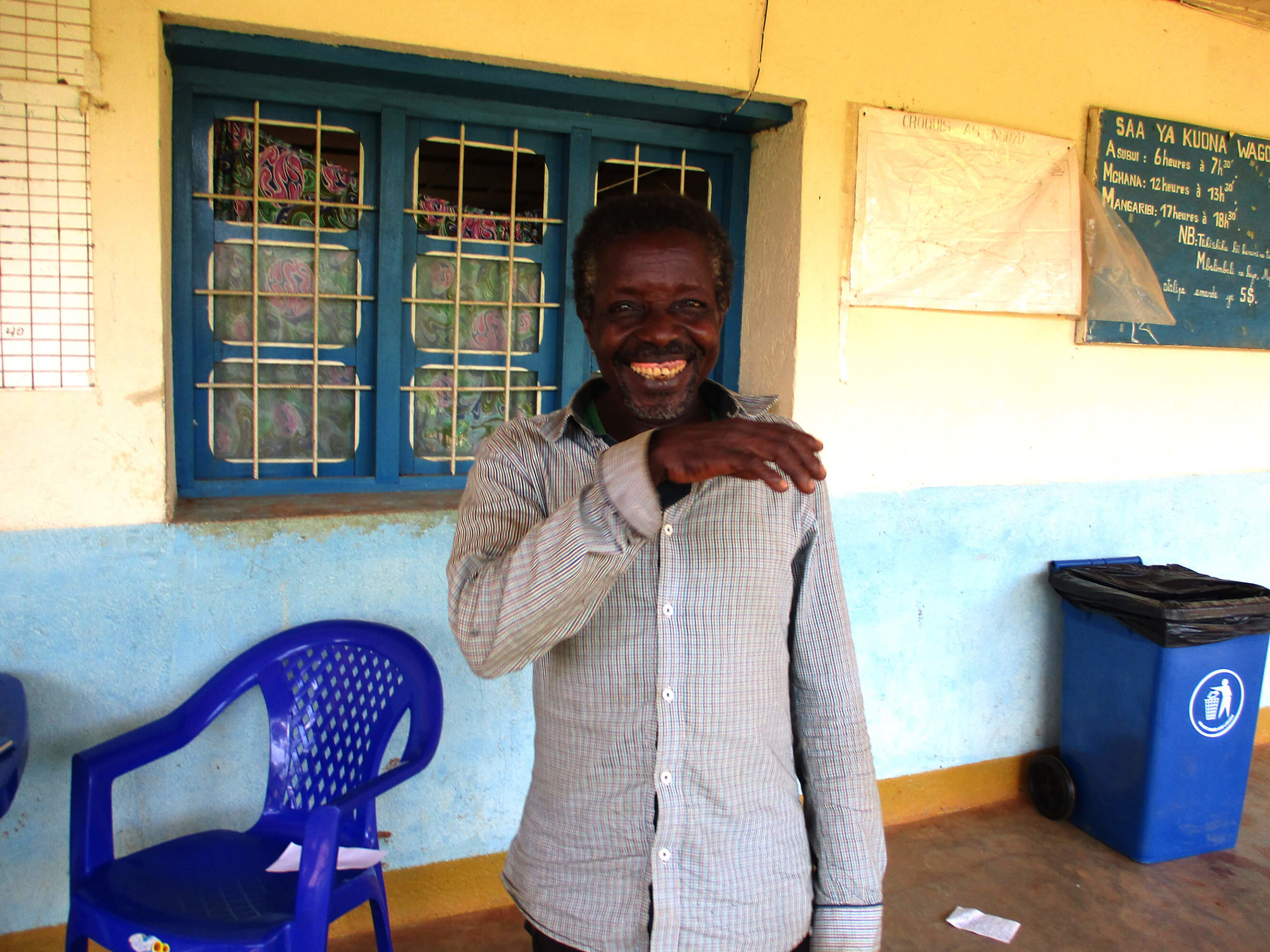
A special mention must also be given to the health workers who braved not only a deadly disease but often an environment vulnerable to conflict erupting at any minute. Despite the risks and level of vigilance needed to maintain a response of this kind, their commitment to the cause never wavered.
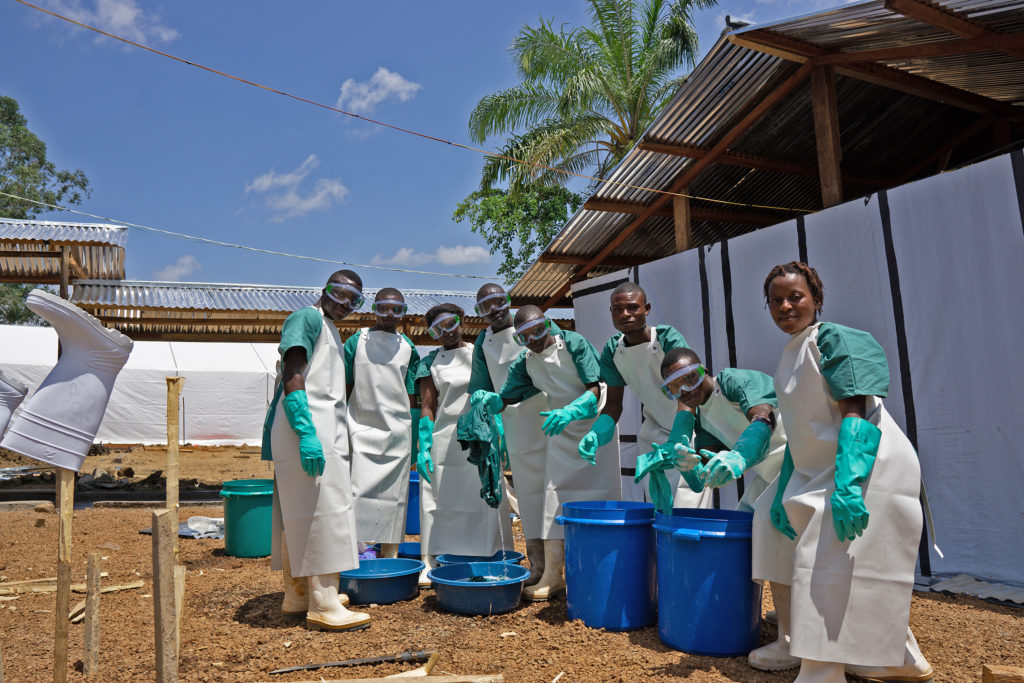
“The west is relatively safe, meaning the chances of the outbreak being controlled earlier are higher. However, funding fatigue, the spread of COVID-19 and other competing needs keep us cautious on how soon this will happen. The people of the DRC still need your support to overcome all these so they can dream of better lives.”
Dr. Eta Ngole, International Medical Corps, DRC
While Dr. Eta can deservedly celebrate the end of the eastern outbreak, our attention is now firmly on the burgeoning outbreak in Mbandaka.
“The risk is still very high. We remain on watch.”
Hear from Dr Rigo Muhayangabo, our #DRC Country Director, in this article by @RadicalMzungu on the vigilance needed among the celebrations as our attention turns to the #Ebola outbreak in Mbandaka ⬇️https://t.co/vMowaiqKuU
— International Medical Corps UK (@IMC_UK) June 26, 2020
But we already know one thing for sure—together, we can stop Ebola.
